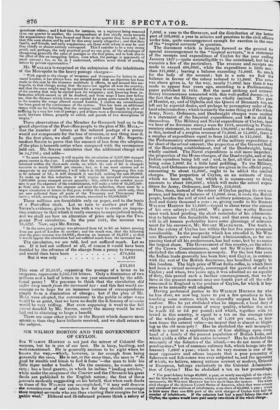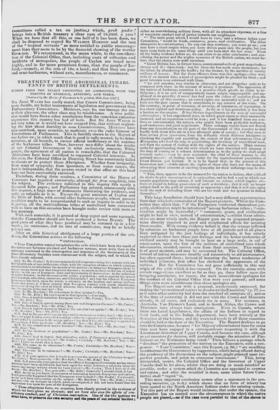SIR WILMOT HORTON AND THE GOVERNMENT OF CEYLON.
Stu WILMOT HORTON is not just the mirror of Colonial Go- vernors, but be is one of our best. Ile is busy, bustling, and well-intentioned. lie is generally anxious to be right when he knows the way,—which, however, is far enough from being generally the case. He is not, at the same time, the man to " do good by stealth and blush to find it fame"—the man to hide his little taper under a bushel. On the contrary, he courts note- liety ; has a local gazette, in which he indites "leading articles," while under the auspices of the Courier and the Chronicle his great deeds are published to the English nation; the first of these journals modestly suggesting on his behalf, that when such deeds as those of. Sir WILMOT are accomplished, " it may well deserve • the. consideration of our rulers how far they should encourage thous tropical. servants who are thus exerting their energies for the public weal." Illiberal and ill-informed persons think a salary of
7,000/. a year to the Governor, and the distribution of the Letter part of 330,000/. a year in salaries and pensions to the civil officers under him, quite encouragement enough for exertion in the e of the " tropical servants" in question. The document which is brought forward as the ground for special encouragement to the " tropical servants," is a statement of the receipts and expenditure of Ceylon for the year ending January 1837 ;--;quite unintelligible to the uninitiated, but let us examine a few of the particulars. The revenue and receipts are made to exceed 406,000/., while the expenditure is little E001.. than 331,000/4 leaving a balance exceeding 75,000/. So muds for the body of the account ; but in a note we find the balance in favour of the colony reduced to 15,000/. The reve- nue above given is, by the way, nearly 75,000/Jess than it was made to appear four years ago, according to a Parliamentary paper published in 1835. But the most striking and extraor- dinary circumstance connected with this well-puffed document, is the fact that the Military charges are wholly omitted. The part of Hamlet, ay, and of Ophelia and the Queen of Denmark too, are left out by especial desire, and perhaps by peremptory order of the local administration ; which is exactly the same thing as if the whole Army, Navy, Ordnance, and Deadweight charges were omitted In a statement of the Imperial expenditure, and left to shift for themselves. The Military and Naval expenditure of Ceylon, (and we hear of no decrease since,) were for 1833, according to Parlia- mentary statement, in round numbers 130,0001.; so that, according to this, instead of a surplus revenue of 75,000/. or 15,000/., there is a surplus of expenditure equal to from 55,000/. to 115,000/. But the Parliamentary statement given of the military expenditure is far short of the actual amount ; the proportion of the General Staff, of the Recruiting establishment, and of the Deadweight, being wholly omitted. The Naval expenditure is still more imperfect; the proportion of the Home charges, of the Deadweight, and of the Indian squadron being left out ; and, in fact, all that is included being some 2,000/. for a little local peddling. To the Military, Naval, and Ordnance charges as they are given in the official paper, amounting to about 15,000/., ought to be added the omitted charges. The proportion of Ceylon, on an estimate of them which we have made, but which it is unnecessary to detail, amounts to about 200,000/.; which will make the actual expen- diture for Army, Ordnance, and Navy, 330,000/. Thus, then, instead of the colony of Ceylon paying its own ex- penses, and leaving a balance of 15,000/. over, it costs the British people, besides the evil of civil and military patronage, three hun-
dred and thirty thousand a year ; or, giving credit to Sir ROBERT WILMOT MORTON for 15,000/.—(equal to about twice the amount
of his own salary)-315,0001. We guess the worthy Baronet must work hard pending the short remainder of his administra- tion to balance this formidable item; and that even doing so, he will in all human probability leave some gleanings of retrench-
ment for his successor, Mr. STUART MACKENZIE. The truth is, that the colony of Ceylon has within the last five years prospered considerably. In the prosperity which has attended it, Sir WIL- MOT HORTON's active and intelligent administration, so far sur- passing that of all his predecessors, has had some, but by no means
the largest share. The Government of this country, on the advice
Of the Crown Commissioners, and not Sir WILMOT Hoar" abolished the odious cinnamon monopoly. For the last four years
the Indian trade generally has been free; and Ceylon, in common with the rest of the British dominions, has benefited largely by this freedom. The high price of West India coffee, in which there had been a virtual monopoly, encouraged the; growth of coffee in Ceylon ; and when, two years ago, it was admitted on an equality of duty, this proved such a further encouragement, that we be-
lieve at the present moment near one- fourth part of all the coffee consumed in England is the produce of Ceylon, for which it hap- pens to be naturally well adapted. Having performed justice to Sir Wiemor HORTON for what he has done, we now beg leave to put a few questions to him,
touching some matters which we shrewdly suspect he has left
undone. Has he yet abolished what he imposed, a local duty a 3s. per pound on cinnamon of every quality, whether the same be worth '2d. or 6d. per pound ; and which, together with O.
levied in this country, is equal to a tax on the average value of the whole produce of Ceylon of 1,400 per cent., or four- teen times the natural value—an impost that is almost as blight- ing as the old monopoly ? Has he abolished the salt monopoly; which is Equal to a capitation-tax of four shillings upon every head of a family of the poorest population of British India, and which yields a tithe of his entire revenue? Has he abolished the monopoly of the fisheries of the island,—we do not mean of the
pearl-oysters,* but of common culinary fish, which brings into the
treasury 7,000/. a year; which in its very essence is one of the most oppressive and odious imposts that a poor peasantry of
fishermen and fish-eaters was ever subjected to, and the ignominy of which, we believe, among nations ancient or modern, Oriental or European, belongs exclusively to the Colonial Administra- tion of Ceylon ? Has he abolished a tax on law proceedings, • The pearl fishery brings 40,000/. a year, or nearly one-eighth of the whole; and for this branch of the revenue, which is pretty much the same under all Go- vernments, Sir WILMOT HORTON has lees merit than the oysters. The whale civil charges of the thirteen United Stated of America, when they were colomes and contained two millions of inhabitants, were short of 65,0001. a year ; which is little more than one-fifth part of the civil charges of Ceylon with half the number of inhabitants. If the colonists had had a pail fishery like that a Oeylimi the claim woele have paid searlf two-thirds of the whole charge. , (sometimes called a tax on justice,) which, proh pudor ! brings into a British treasury a clear sum of 10,0001. a year? When we hear that all this, or one half of it has been done, we shall be disposed to regard Sir WILMOT HORTON and the rest of the "tropical servants'' as more entitled to public encourage- ment than they seem to be by the financial showing of the worthy Goiemor. We recommend, in the mean while, to the considera- tion of the Colonial Office, that, including costs of collection and incidents of monopolies, the people of Ceylon are taxed more highly, and in far more pernicious forms, than the people of Ire- land,-namely, at the rate of 10s. a head ; and that they are poor and semi-barbarous, without arts, manufactures, or commerce.



























 Previous page
Previous page